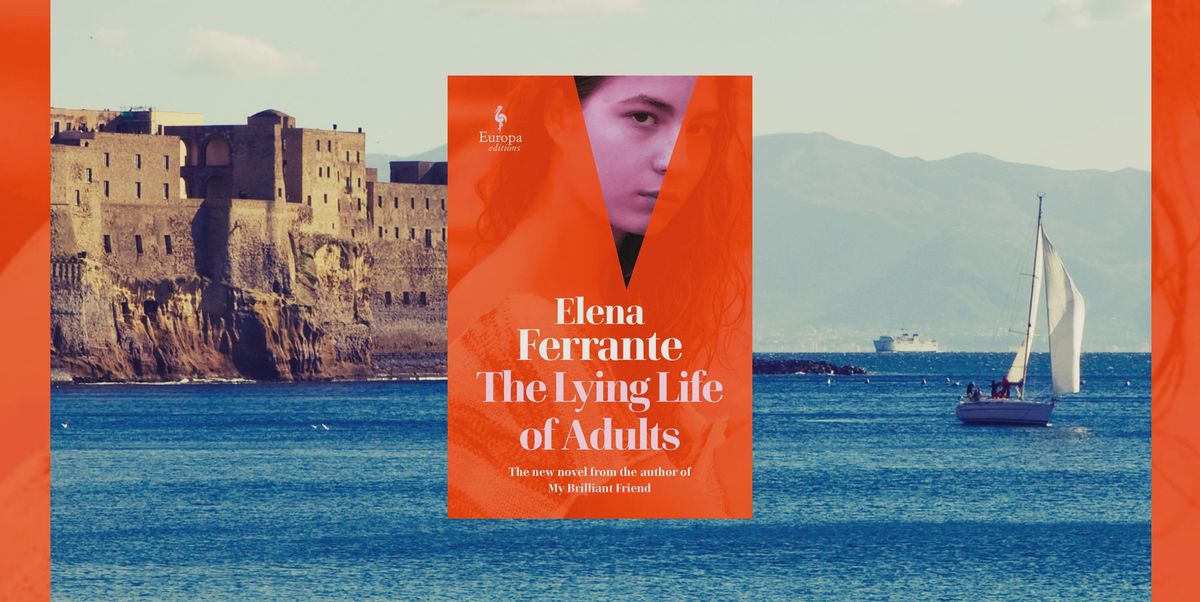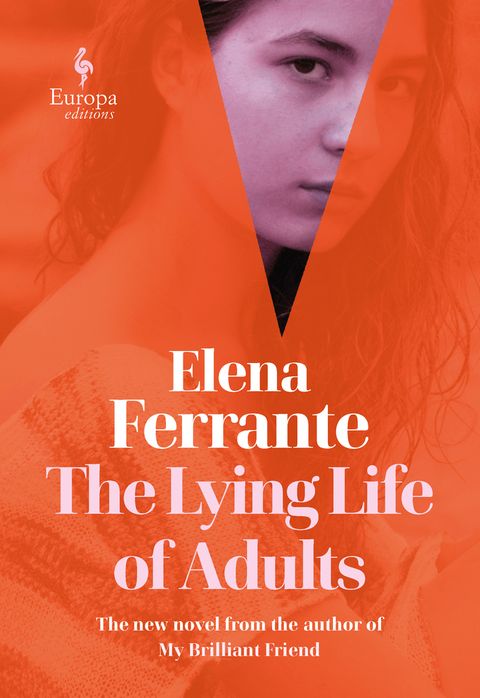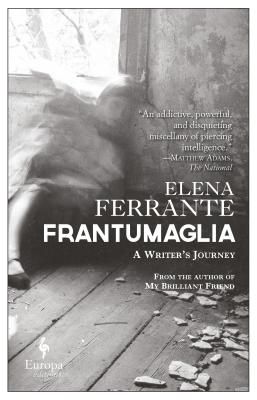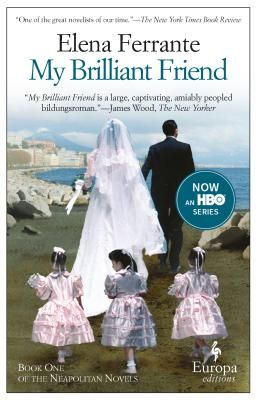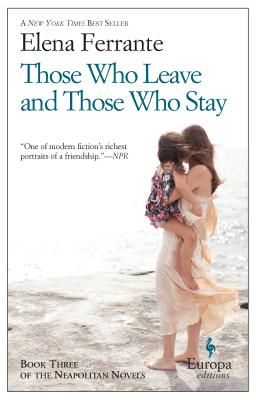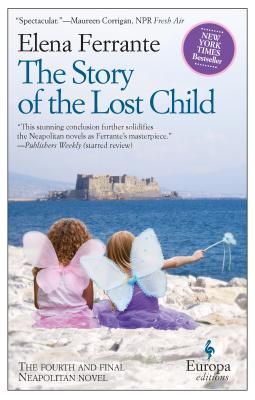Five years after publishing the final installment in the Neapolitan quartet—the global literary sensation chronicling the friendship of two extraordinary women in four volumes (and later, an HBO/RAI series)—Elena Ferrante is back in Naples with The Lying Life of Adults, a brand-new story that probes the mind of a teenager grappling with facades, fictions, and a startling exposure to her roots.
Giovanna is 13, precocious, well-educated, and beloved by her fashionable parents—although, according to her father, she’s getting ugly like her estranged aunt Vittoria. Thus begins Gianna’s descent into the Naples of her father’s past: impoverished, lurid, ruthless, and endlessly fascinating. As Giovanna connects with her aunt and examines her family’s history and mythologies, she faces down the many discomforts inherent to the journey to adulthood.
In a U.S. exclusive, ELLE.com is proud to present The Elena Ferrante Interview, 28 questions from 28 of the countries that will publish The Lying Life of Adults on September 1. In Part I, Ferrante reflects on the plot of her new novel, her fascination with Naples, and the story of Elena and Lila. Click here for Part II, where the author discusses her writing process, the universal appeal of her work, and the effect of the COVID-19 pandemic on women. —Julie Kosin, senior culture editor, ELLE.com
Part I
Marcello Lino, translator for Intrinseca, Brazil
Neapolitan dialect plays an important role in your novels, and for many of the characters is probably the natural expressive means. It is seldom manifested explicitly, however, and is, rather, described or expressed through an Italian with dialectal cadences. Could one say, then, that you, too, at times are doing a work of translation, hearing the voices of these characters in dialect and turning them into Italian?
Of course, but it’s a vexed, I would say unhappy, translation. To explain this I have to talk about the nature of the narrators I’ve constructed up to now. In my books, the narrator is the “voice” of a woman with Neapolitan origins, who knows dialect well, who is well educated, who has lived far from Naples for a long time, and who has serious reasons for hearing Neapolitan as the language of violence and obscenity. I’ve put “voice” in quotation marks here because it’s not at all about voice but about writing. Delia, Olga, Leda, Elena, explicitly or implicitly, are writing their story and in doing so resort to an Italian that is a sort of linguistic barrier against the city they come from. To varying degrees, they have fabricated for themselves—let’s say—a language of flight, of emancipation, of growth, and have done it against the dialect-speaking environment that formed them and tormented them during childhood and adolescence. But their Italian is fragile. Dialect instead is emotionally robust and at moments of crisis imposes itself, moves into the standard language, emerges in all its harshness. In other words, when, in my books, Italian succumbs and takes on dialectal cadences, it’s a sign that, in the language as well, past and present are getting anxiously, painfully confused. I don’t, in general, mime dialect: I let it be felt as the possible eruption of a geyser.
Király Kinga Júlia, translator for Parks Publishing, Hungary
In your previous novels, it could take a woman decades, if not a lifetime, to legitimatize her interests and emancipate herself. In this novel, on the other hand, Giovanna manages to overcome conditioning and routine in a magnificently short period of time. Is she a special case or is it because of a generational change, or has the success of the aspirations and efforts of our mothers contributed to our empowerment?
Giovanna is very far from Lila and Lenù. She has had a good secular, super-democratic education. Her parents, both teachers, expect their daughter to become a very cultivated, respected woman who is free and independent. But a small event jams the machine designed for her, and she starts to see herself as the damaged product of a duplicitous milieu. So she desperately begins to cut her upbringing out of herself, as if she wanted to be reduced to the plain truth of her own living body. Lenù and Lila also try to tear the neighborhood out of themselves, but while they have to laboriously fabricate the tools to help them break free of real and figurative poverty, Giovanna finds those tools at home, ready to be used against the very world that has provided them. She is already armed for her revolt, so it’s quick and resolute. But to throw into disorder one’s cultivated “I” is a dangerous undertaking. You can’t change your form for one that seems truer without the risk of not finding yourself anymore.
Jiwoo Kim, translator for Hanglisa Publishing, Korea
Compared with the female characters, the “Ferrantian men” seem to be rather simple or dull. Is there a male character you consider a more positive figure with respect to the others or whom you are especially fond of?
Enzo. I like men who use their strength discreetly to help you live—without too many words, without sentimentality, without expecting compensation. Real understanding of women seems to me the highest application of the male’s intelligence and capacity for love. It’s something rare. I don’t want to talk here about rough, violent men, whose latest incarnation is the truly vulgar, aggressive types on social media and TV. It seems to me more useful to talk about cultured men, our companions in work and study. The majority continue to treat us like charming animals, giving themselves credit just for playing with us a little. A minority have superficially learned a formula for being “friends of women,” and want to explain what you have to do to save yourself, but as soon as you make it clear that you need to save yourself by yourself, the civilized patina cracks and the old, intolerable little man emerges. No, in all ways our manly educators should be re-educated. For now the only one I trust is Enzo, Lila’s patient companion. Of course, even this type of man may at some point get fed up and go, but at least he leaves behind a good memory.
Esty Brezner, bookseller, Ádraba, Jerusalem, Israel
In your opinion, to what extent can a person “leave Naples,” or reinvent herself far from her origins and the “destiny” assigned to her at birth?
I would begin by emphasizing that leaving is not betraying one’s origins. Rather, we have to leave in order to assign origins and establish them as the foundation of our growth. Wandering, we transform our bodies into crowded warehouses. New materials weigh on the original ones, modifying them by merging with them, blending with them. We ourselves seesaw between various ways of being, sometimes enriching our identity, sometimes impoverishing it by subtraction. But our birthplace endures. It’s the ground upon which our primary experiences stand, where we first exercise our gaze, first imagine, first express ourselves. And the more solid we find that ground to be, the more varied is our experience of elsewhere. Naples would not be my single true city if I hadn’t soon discovered, in other places, in contact with other people, that there and only there did I begin timidly to say to myself “I.”
Ana Badurina, translator for Profil, Croatia
In every one of your novels, the relations between women and men are very fragile and for the most part unhappy, while the truly formative experiences, in various ways, are those between women. Would it interest you to pursue, both as a writer and as a reader, a narrative in which a relatively “happy” relationship between a man and a woman was possible? Or do you think it would be hard for a story like that to be convincing in a literary context?
What isn’t convincing in literature is often the result of an edifying reading of reality. I’m not one of those who believe that happiness begins when the story ends (I’m thinking of the formula “And they lived happily ever after”). One can surely describe a happy couple: I’ve known many. Once I even wrote a story in which a very unhappy woman decided to conduct an investigation, just as in a detective novel, into the happy married life of her aging parents. I don’t want to bore you here with the development of that story. I will say only that you, Ana, summarized the whole story very well by using the expression “relatively ‘happy’ relationship between a man and a woman.” I think happiness can be written about, but only if that “relatively” is developed and if the reasons for the quotation marks that you’ve put around the word “happy” are examined.
Audrey Martel, bookseller, Librairie l’Exèdre (Gallimard), Quebec
In what way has Italy conditioned you as a writer, or, to be more precise, in what way has the place where your novels unfold influenced the stories and lives of your characters?
An important part of my experience occurred here, in Italy. What I care about is in this country, starting with the language I’ve used since I learned to speak, since I learned to read and write. But as a girl I was bored by everyday reality. The stories to be told were not in my house, or outside my windows, or in my language or dialect, but in other places, in England, France, Russia, the United States, Latin America, and so on. I wrote exotic stories that eliminated Italian geography and Italian names, which seemed unbearable to me, I was sure they would kill any story at birth. The great literature that inspired me wasn’t Italian or, if it was Italian, ingeniously found a way of avoiding the Italianness of cities, characters, dialects. It was a childish attitude, but it lasted until I was at least twenty. Then, when I seemed to know a fair amount about the literatures I loved, I began slowly to get interested in the literary tradition of my own country. I learned to use the books that made the deepest impression to give myself a sort of momentum to write about what until then had seemed to me too local, too national, too Neapolitan, too female, too much my own to be narrated. Today I think a story works if it can narrate what you alone contain, if it occupies an ideal place within books you’ve loved, if you write here and now, against this background you know well, with an expertise learned by digging passionately into the literature of all times and all places. As for characters, it’s the same thing: They’re empty if they don’t have some kind of knot that tightens at times, then loosens, a bond they may want to sever and yet endures.
Dina Borge, bookseller, Norli Nye Sandvika, Norway
What inspired you to write The Lying Life of Adults? Do you think that adults habitually lie about their lives? To others, to their children, and even to themselves?
As a girl I was a liar and was often punished for my lies. At around fourteen, after a lot of humiliation, I decided to grow up and stop lying. But I slowly discovered that while my childish lies were exercises of imagination, adults, so opposed to lies, lied easily to themselves and others, as if the lie were the fundamental tool that gave you consistency, meaning, allowed you to withstand the confrontation with your neighbor, to appear to your children as a model of authority. Something of this adolescent impression inspired the story of Giovanna.
Demetra Dotsi, translator for Patakis Editions, Greece
Smarginatura is one of the key words in The Neapolitan Novels, or, rather, to use Lila’s definition, her “sensation of moving for a few fractions of a second into a person or a thing or a number or a syllable, violating its edges.” Could one say that Giovanna, too, undergoes a sort of smarginatura, maybe in a permanent way, when the flimsy veil of her family’s perfection is lifted and she occupies a new image of herself?
Yes, now, as I’m answering you, I think so. But one must keep in mind that in Lila it’s a bodily reaction, in a certain sense a pathology. Smarginatura is the word she uses to designate an earthquake whose epicenter is a sudden dysfunction of the five senses. Giovanna to me seems closer to Elena, who in writing adapts the word used by Lila and accentuates its metaphoric value. In her, smarginatura comes to mean forcing oneself, overflowing the neighborhood, crossing borders, becoming something else and something else again, a tearing of veils with the suffering but also the pride that goes with it. Lila is physically overwhelmed by her symptoms; they’re so violent she gets sick. Elena and Giovanna dissolve their boundaries into metaphor, and metaphors hurt a little less
Elsa Billund, bookseller, Billunds Boghandel, Fredericia, Denmark
Why do you return to Naples in this new novel? What, about this particular place, needs to be narrated again and again? Can you imagine ever writing about some other place? And do you think it would be simpler or more difficult?
One can write about any place, what’s essential is to know it thoroughly, otherwise you risk superficiality. I’ve been in many places, and written pages and pages of notes. I have a lot of notes, for example, on Copenhagen, and I could use them in a story, as I’ve done, say, with Turin, a city I love. But they seem like places that don’t belong to me, and if I write about them I write about them to appropriate them. With Naples it’s different. Naples is already part of me, as I am of Naples. I don’t have to look for a view of Naples, I’ve had it since birth. I write about it again and again to see it and see myself and so that it sees me, more and more clearly.
Dr. Chen Ying, translator for Shanghai99, China
Naples is a provocative city, for better or for worse, and it’s always the protagonist of your novels. In The Lying Life of Adults, this city is divided into two worlds: the high neighborhood and the low neighborhood. In your new novel did you try to connect these two microcosms?
I’ve always been fascinated by the high-low opposition. With some simplification I could say that ascend, descend, rush down, reascend are verbs that I usually tend to construct my stories around. You’ve noted that in my new book the high-low relationship is central. It was the toponymy of the city that encouraged me to go in that direction. In Naples there is actually a neighborhood on the hill called Rione Alto, High, or Upper, Neighborhood. To get there you have to climb a narrow street called San Giacomo dei Capri. It seemed to me interesting that Andrea, Giovanna’s father, lives with his family in that Rione, thus making use even of his address to eliminate his “low” origins. It’s the daughter, Giovanna, who, in the course of her adolescent rebellion, discovers the artificiality of the boundaries that her father always wanted to accentuate. She violates the paternal order and drags the upper down and the lower up, so that she becomes the locus of the abrupt mixing of antithetical elements, the space where beauty and ugliness mingle, new and old, refinement and coarseness, as she mocks the yearning for distinction of her father with his newly acquired culture.
Stefanie Hetze, bookseller and owner of the bookstore Dante Connection, Berlin, Germany
For Lila and Elena, the experience of reading Little Women is extremely important. What (other) literary figures fascinated and profoundly affected you as an adolescent?
To answer I would have to make a long and probably boring list. Let’s say that I devoured novels in which the female characters had ill-fated lives in a fierce, unjust world. They committed adultery and other violations, they saw ghosts. Between twelve and sixteen I eagerly looked for any books that had a woman’s name in the title: Moll Flanders, Jane Eyre, Tess of the d’Urbervilles , Effi Briest, Madame Bovary, Anna Karenina. But the book I read and reread obsessively was Wuthering Heights. Today I still find extraordinary the way it describes love, mixing good and bad feelings without any break. Catherine is someone who should be revisited from time to time: She’s useful, when you write, for avoiding the danger of sickly-sweet female characters.
Monica Linkdvist, bookseller, Akademibokhandeln, Stockholm, Sweden
Do you identify with any of the main characters in The Neapolitan Novels or in the new novel?
I will answer with a cliché: All the characters, including the men, have something of me in them, of necessity. If we know a fair amount about the bodies of others, the only inner life we really know is our own. So it’s relatively easy to learn to look, and to grasp a meaningful gesture, an expression, the features of someone’s gait, a way of speaking, an eloquent gaze. It’s impossible, however, to move into the mind of someone else: The writer always risks simplifications, like a psychology textbook, and it’s depressing. We have only our own mind, and it’s an arduous task to dig out of it some truth with which to animate fiction. There’s a raucous crowd in there that adds everything together amid conflict and confusion. Thus the inner life of another is in the end the literary product—always insufficient (too linear, too cohesive, too logical)—of an exhausting self-analysis helped by a vivid imagination. But you asked me to indicate a character I identify with, and I will tell you that at the moment I like certain features of Aunt Vittoria, in The Lying Life of Adults. It’s not me, but certainly I am glad to be her author.
Margarida Periquito, translator for Relogio d’Agua, Portugal
I’d like to know if Andrea’s remark in The Lying Life of Adults, which so upsets Giovanna, is an echo of Emma Bovary’s thought about her daughter “…comme cette enfant est laide!—how ugly this child is!,” a judgment that, according to what we read in Frantumaglia, you wanted to use in your own writing, to feel its weight and see if it could be a woman’s phrase.
Yes, but it’s not just a matter of literary origins. As a child, I long felt that remark of Emma’s as one that might concern me. I said to myself: wouldn’t it be terrible if my parents disliked not only my physical appearance but certain character traits as well? At least in part, Giovanna comes from the discomfort of that page of Madame Bovary combined with an anxiety of mine. As for whether such an exclamation—how ugly this child is!—coming from a mother even as frivolous as Emma is plausible, no, I haven’t resolved the problem. I gave the remark to a father, and yet, in the story, Giovanna’s mother doesn’t rebel, doesn’t contradict her husband.
Anna Yampolskaya, translator for Corpus, Russia
The city of Naples is among the protagonists of your books, including The Lying Life of Adults. What does this city—its streets, its inhabitants, its language—represent for you? As for the language: Have you ever thought of following the example of Andrea Camilleri—whose novels are often set in Sicily—and developing a particular language that mixes literary Italian and Neapolitan dialect?
Naples is a complex city, not reducible to a literary or sociological formula. I feel it as my city, the city of my forebears. It contains a long stream of experiences, my own and those of many people I preserve in my memory, with their voices. The voices, precisely. Naples is unthinkable without its dialectal sonority. Dialect moves through every level of society. I’ve known well-off, cultured people who had mastered various languages and yet, on every occasion, used Neapolitan, in its popular forms and in its finely crafted literary styles. But I have never had a good relationship with dialect, in either its harsher or its more engaging version. There are many reasons; here I’ll mention just one that, however, contains them all. But first I have to briefly describe an old upset of mine. Sometimes, especially as a young girl, when, for school, I had to translate Latin and Greek passages into Italian or put a hundred lines of sixteenth-century Italian, let’s say, into contemporary Italian, and was in a hurry—there was a lot of homework, the afternoon wasn’t long enough—I’d have a breakdown: I’d hear the languages as a flood of voices overlapping through time, a sort of theater in my mind, where the dead and the living were speaking all together in a roar that wore me out. That hallucination has passed, but not in the case of Neapolitan. There it endures, and in a way that goes far beyond that old impression of adolescence. Neapolitan seems to me to have such sonorous power, such a devastating emotional charge, that I don’t want to wrong it by enclosing it in the alphabet, like a tiger in a cage. When I write, I look at it, I keep it at bay, I use it with trepidation. And I always leave out its ironic-pathetic-sentimental-good-natured tonality. I prefer an aggressive, sarcastic tone, a threat for the women I’m describing.
Ioana Zenaida Rotariu, bookseller, St. O. Iosif, Brașov, Romania
How much do you think friendships change our lives?
A friend doesn’t change us, but changes in her quietly accompany changes in us, in a continuous, mutual effort of adaptation.
Muauia al-Abdulmagid, translator for Dar al Adab, Lebanon
In the fourth volume of The Neapolitan Novels you mention the universality of human violence and allude to the Arab world and Islamic culture: Dede’s husband is of Iranian origin and her son’s name is Hamid, etc. Might we, then, expect from Elena Ferrante a novel centered on the current conflict between Islam and the West, focusing on contemporary political themes such as racism, terrorism, immigration, and Islamophobia?
In addition, you allude briefly to one of the most memorable scenes in contemporary history: September 11, 2001. Do you see in it a concrete example of smarginatura, “dissolving margins”? Is there a visual connection between the collapse of the two towers and the earthquake that strikes Naples and terrifies Lila to the point where she sees people smarginarsi, or lose their outlines? Is smarginatura therefore a metaphor for violent metamorphosis?
I gladly return to the word smarginatura, Yes, it has to do with violence, but in the sense that it sums up in itself the effects of an uncontrollable force that breaks down the outlines of people and things. The artificial margins within which we are enclosed and within which we enclose others suddenly become illusory and can’t hold up, and the atrocious spectacle of destruction and self-destruction takes place right before Lila’s eyes. And even when, in the course of the story, the word shifts its meaning, and becomes a metaphor for growth, the revelation of truth, and so on, it is always accompanied by an idea of rupture, laceration, explosion. Our common life is full of disruptive actions; we can’t escape violence, even in figures of speech. I’ve written a lot about it, and—with regard to your first question—I would answer no, at this point it’s unlikely that I would write about terrorism, racism, Islamophobia: the end of the Neapolitan quartet is intended simply to indicate how Elena’s horizon has widened through her daughters, their husbands, grandchildren, is no longer fixed in the neighborhood but against the broader and very dangerous background of the planet.
On the other hand, I will continue to declare on every occasion how much I hate violence, especially against the weakest, but also violence of the weak against the weak, and even violence that is justified by the intolerable nature of all kinds of oppression. The human being is a fierce animal that has sought to domesticate itself through religion, through the admonitions of its terrible history, through philosophy, through science, through literature, through the hazardous connection between goodness and beauty, through regulating conflict in a way that is entirely male, from the duel to war. But up to now the result has been a widespread form of hypocrisy: war, for example, includes punishment for specific crimes called war crimes, as if it were not in itself, by its nature, an atrocious crime; human rights, which should be peacefully supported, are a permanent battlefield, are continuously violated or defended; the state claims it has a monopoly on violence, but first of all that’s not true, and, second, it’s far too obvious that that monopoly is abused: Broad portions of the global population know that they have to fear, above all, the government’s police, even where democratic traditions are strong. Nor are we women strangers to the practice of violence: This should be said emphatically. But we have been so relentlessly exposed to male violence, and so fully excluded from the means by which men have practiced it, that perhaps only we, today, can find a nonviolent way of banishing it forever. Unless, confusing emancipation with co-optation, we end up handing ourselves over, even in this, to the male tradition of aggression, extermination, devastation, at the same time making its learned rationales and petty regulations our own.
Part II
Enza Campino, bookseller, Libreria Tuttilibri, Formia, Italy
While I believe that the truth in your stories is the universal key that excites readers so different in terms of culture and geography (to know that Michelle Obama and a Chinese manager will read you, Madonna and a Turkish girl), I would ask how much your relationship with the reality that runs through your novels is influenced by that fact.
Writing is a very private activity. I’ve always written for myself, and much of my writing has stayed in my drawers. But whenever I’ve decided to make a story public, I’ve always hoped that it would go as far away from me as possible, that it would travel, that it would speak languages different from the one I wrote it in, that it would end up in places, houses, hidden from my view, that it would change mediums and become theater, film, television, a comic book. That’s how I’ve thought, and it hasn’t changed. My writing is very timid, while I’m writing, but when it decides to become a book it gets ambitious, it’s immodest. I mean that I am not my books—I don’t dare have a life that is autonomous the way they do. Let the books go as far as they can, I will continue to write according to my taste, how and when I feel like it. From the moment they put on an editorial guise and leave, my independence has nothing to do with theirs.
Lola Larumbe, bookseller, Librería Rafael Alberti, Madrid, Spain
Many characters in your novels are torn between love and friendship. Would you prefer to have with you forever a friend or a lover?
I would prefer a lover who is capable of deep friendship. This mixture is hard to understand when you’re young, but with maturity, if you’re lucky, it gradually opens new horizons. I’ve always liked finding in old correspondences between lovers expressions like “my friend.” Similarly, the appellation “sister,” which appears first in chivalric literature and continues for centuries, never seemed to me a sign of the decline of desire: on the contrary.
Suomalainen Kirjakauppa, bookstore, Helsinki, Finland
How did Lila and Lenù come to you? Why did you want to tell their story in particular? Is there something that you would like your readers to know about you? And in what way is living in Naples different from, say, living in Rome? What makes Naples unique?
Lenù and Lila are ghosts, like all those who live in writing. At first they show up as brief, fleeting apparitions, somewhat resembling people whom we haven’t seen for a long time or who are dead. We hold on to them with a few sentences, shut them up in a notebook, later reread them. If the sentences have strength, the ghosts reappear, we capture them with more words. And so on: As the chain of words acquires energy, so the feeble apparitions put on flesh and bones, define themselves, bring with them houses, streets, landscapes, Naples, a plot within which everything moves and has heat, and it seems that only you can give those indistinct forms definition, and even an appearance of real life. But it doesn’t always go well; in fact very often it goes badly. The ghosts get the address wrong, they’re too unstable, the words are false or lifeless, the city is only a name, and if someone asks you how it’s different from, say, Rome, you don’t know the answer, and you can’t find it in the more or less moribund sentences you’ve written.
Ieva Mazeikaite, translator for Alma Littera, Lithuania
Many of the protagonists of your novels leave the city of their birth as soon as they become adult. To what degree does this departure from Naples influence the development of the character?
Going away is important but not decisive. Lenù goes away, Lila never abandons Naples, but they both develop, their lives are full of events. As I’ve said, I feel close to Elena’s choices. We don’t have to fear change, what is other shouldn’t frighten us. But staying doesn’t seem wrong to me; what’s essential is that our “I” not be impoverished if we should confine ourselves to a space forever. I like people who are able to have bold adventures just going from one end to the other of the street where they were born. I imagined Lila like that.
Ivo Yonkov, translator, and Dessi Dimitrova, bookseller, for Colibri, Bulgaria
Why do you continue to return to a painful past? Is writing for you a form of self-therapy? And what do you think of the literature that is studied in Italian schools? Do you think it reflects the dynamics of the world we live in? What values does it promulgate? And are these values that you share?
No, I’ve never considered writing to be a form of therapy. Writing for me is something entirely different: It’s twisting the knife in the wound, which can hurt a lot. I write like those people who take airplanes all the time because they have to but are afraid they won’t make it, they suffer during the whole flight, and when they land they’re happy though reduced to a limp rag. As for schools, I don’t know much about how they work today. When I was in school, readings that as an adult I found marvelous were transformed into extremely boring exercises that had to be graded. School, in teaching literature, eliminated the pleasure of empathy and imagination. If you take the energy out of a sentence by playing around with that adjective or this figure of speech, you will leave on the page only pale alphabetic combinations and turn young people, in the best case, into refined con men.
Fleur Sinclair, bookseller, Seven Oaks Bookshop, Sevenoaks, U.K.
With so many events in a novel that begins with something that is said and can never be retracted, at an especially sensitive moment in Giovanna’s adolescence—I wonder if there is something that makes you want to go back and speak to your adolescent self (or maybe something you wish your adolescent “I” had overheard). Something that, in short, could have changed the course of your life, something that gave you confidence and the impetus to do earlier something that you did, or kept you from doing things that today you regret.
In our daily lives, what has been has been. We don’t talk about adolescence later: as far as I’m concerned it was a stagnant time, inconsolable. As an adult, I have always been careful not to say to an adolescent, even one who is apparently happy: lucky you. I think that the sooner this period ends, the better. On the other hand, writing about it is thrilling. I suspect that a little piece of adolescence peeks out in all books, whatever their subject, precisely because it’s a phase of thunder, lightning, storms, and shipwrecks. You’re almost a child, almost an adult, it takes an eternity for your body to get rid of one shape and assume another. Language itself doesn’t seem to possess the right form for you, sometimes you talk like a child, sometimes you express yourself like a grown woman, and either way you’re embarrassed. In reality the past doesn’t change. But, when you write, adolescence changes color inexhaustibly. Every fragment can find its place and suddenly gain its rightful meaning in the story. If you write, that static, asphyxiating time, observed from the edge of adult life, begins to flow, is made and remade, finds its motivations.
Fe Fernández Villaret, bookseller, L’Espolsada Llibres, Barcelona, Catalonia
First I’d like to tell you that I found reading the four volumes of The Neapolitan Novels a pleasure. As a bookseller I’ve recommended them to everyone, but they’ve been read mainly by women, because, from the start, they were classified as reading “for women.” Your books have a female outlook, but that doesn’t mean that they’re exclusively for women: on the contrary. In your opinion, why do books that look at the world through women’s eyes not interest men? For years life, history, and everything that happened has been recounted by them. Thank you for your contribution to making the female universe richer and more varied.
What to say? Men, including very cultured men, often don’t even try to read them, our books, that is. They consider them, as you point out, “for women,” and this formula not only seems to protect their virility from any possible degradation but above all denies us the gift of universality, a quality they attribute solely to themselves. They write books for men and women, whereas we can write only for women. It’s one of the many signs of how they continue to consider us human beings of an inferior grade. At times we ourselves seem to support them, practically exclaiming, like Euripides’ Iphigenia: “One man’s life is worth more than the lives of ten thousand women.” We have been brought up with the idea that a person of the male sex has, among his many marvelous prerogatives, that of encapsulating in himself the whole world. When a man produces a work—great, small, tiny—he automatically addresses the human race, Martians, Venusians, he feels ready for the possible and the impossible. We, they’ve told us, were not born for that. Their intelligence and talent are virtues. Our intelligence and talent are defects. To mention just one example, the extraordinary Baudelaire, to whom all of us, male and female, owe so much, wrote that feminine beauty lasts longer if it’s not accompanied by intelligence, and he underlined this by saying, in his provocative way, that to love intelligent women is the pleasure of a pederast. Things change, of course, and they are changing, but, especially deep down, too slowly. Even today, if I say that the very greatest literature isn’t universal, but only the very greatest male literature, I make people uneasy, and seem a little harsh. But it’s true.
Malgorzata Zawieska, bookseller, Korekty, Warsaw, Poland
In your books you confront an important question: the emancipation of women through professional life. What do you think of the possible effects of the coronavirus on the situation of women? Do you think it will make economic disparities worse, forcing us to take steps backward with respect to gains on the road to emancipation? Do you think this could be an interesting theme for a writer?
I’m still feeling the effects of the fear and disorientation at how easy it’s been for the terrible living conditions of the weakest on the planet to get worse within a few weeks. I’m not especially interested in the virus. It’s the fragility of the system that has frightened me, so much that I have trouble explaining it. I mean that everything was abruptly reduced. In an extraordinarily short span of time obedience ended up at the top of the hierarchy of values. And women have received more orders than usual, assigned, as they traditionally are, to forget themselves and see to the material survival of the family: feed, watch over, care for, isolate, isolate themselves, and meanwhile feel guilty for everything, as if until that moment they had had too many expectations. In this picture, the step backward seems inevitable, in order to deal with the primary demands: food, water, a roof, medicine. Yes, I believe that rather than the spread of the pandemic, what should be related is how the spread of fear changes us, taking meaning away from higher-level demands and fine ambitions, in short from all that “doing” that hums along when the economic-social-cultural system pretends to be solid. But, as I said, I have to think about it. For now, the problem is what to do to keep the matter of women central. It has to be felt as something fundamental.
Tim van den Hoed, bookseller, De Utrechtse Boekenbar, Utrecht, the Netherlands
The fascination that Naples exerts on me has brought me to the city twice. The four volumes of The Neapolitan Novels and my personal experiences in the city coexist and sometimes merge, like the many characters in the novels. To what degree was the use of different characters important in creating a portrait of Naples? And is there a secondary character that you feel closer to?
You’re right to emphasize that our gaze is our own and, at the same time, mixed into it are many other points of view expressed in novels and in various other ways. This is true for everyone and naturally also for a writer, who offers the public her own way of seeing, which is absolutely unique and yet anything but singular. Flowing into it, in fact, are forebears, geography, history, philosophy, sciences, books read, oral and written narrative techniques learned, many clichés, and, especially, the continual contact with others, the way the writer has deduced and imagined their feelings and thoughts, what is unsayable and yet, if she’s decided to tell a story, what she must find the words for. In the story of Naples—but also in the story of objects much simpler than Naples—all these things are set in motion, and for the most part the writer doesn’t even realize it. There is a continuous mixing, contaminating, even spoiling, that constructs a world that is fake but that, if it succeeds, ends up being more true than the truth: the truth that is right before our eyes but that we’ve never seen. Whether or not this result is actually achieved, the writer never really knows. Not even success assures him, in fact as soon as the book is finished the author becomes less substantial than the background characters.
As an author, if I have to tell the truth, I feel like the mother of the Solaras. She has the whole neighborhood in her fist, with that red loan shark’s book, and yet she’s a small woman, of minor importance. She appears only for a few lines, uncomfortable because of the heat, fanning herself.
Readings Victoria, bookstore, Australia
What does it mean to you when you hear talk of “female writing”?
I will take advantage of this question of yours to explain. There is nothing wrong with saying “female writing,” but it should be done with caution. Since there exists experience that is unquestionably female, every expression of it, oral or written, should have the unequivocal stamp of a woman. But unfortunately it’s not so. Every means that we women make use of to express ourselves doesn’t really belong to us but is, historically, a product of male dominance, above all grammar, syntax, individual words, the very adjective “female” with its various connotations. Literary writing is obviously no exception. And so literature by women can only move, laboriously, from within the male tradition, even when it asserts itself forcefully, even when it seeks its own specific genealogy, even when it absorbs and, within fixed margins, makes the mingling of the sexes and the irreducibility of sexual desire its own. Does this mean that we are prisoners, that we are fated to be hidden forever by the very language in which we try to talk about ourselves? No. But we have to realize that, in this context, to express ourselves is a process of trial and error. We have to start constantly from the hypothesis that, in spite of so much progress, we are not yet truly visible, we are not yet truly audible, we are not yet truly comprehensible, and we have to remix our experience countless times, as one does with a salad, reinventing surprising voices for people and things. We have to find the very mysterious way (or ways) in which, starting from a crack, from something discarded among the already established forms, we arrive at writing that is unpredictable even for us who are working on it.
Ivana Dobrakovová, translator for Inaque, Slovakia
Up to now, you’ve always used the perspective of an adult narrator (Leda, Olga, Delia), or you’ve let the protagonist grow up (Elena) and then go back in time in the narrative; why did you change in the case of Giovanna?
I don’t think I’ve changed. But there is something different. I left the identity of who is giving literary shape to Giovanna’s “I” undefined. Reread, cara Ivana, the very short prologue, which alludes to a “tangled knot, and nobody, not even the one who at this moment is writing, knows if it contains the right thread for a story or is merely a snarled confusion of suffering, without redemption.” And while you’re reading keep an eye on “the one who.” I care deeply about this passage. My narrators are always thought of as distant from the narrated facts. They feel at the time they start writing that they are very different from what they were in the story, and they have to get as close as possible to what they were in order to succeed in talking about themselves. In the case of Giovanna the one who is writing is also removed in time from the events related and is having trouble with the story. But the fact that we could call new, for me, is that “the one who” isn’t necessarily Giovanna.
Ann Goldstein, translator
How do you work? Do you make a lot of corrections, and of what type? Do you consider yourself a good self-editor? Do you often make word changes or changes in the language?
The decisive point for me is to arrive, starting from nothing, at a dense, chaotic draft. The work on the draft is grueling. It takes a lot of energy to get a text with a beginning, an end, and its own crowded vitality. It’s a slow approach, like tailing a life form that has no defined physiognomy. Occasionally I can keep rolling along, even without rereading, but that’s rare. More often I advance by a few lines every day, writing and rewriting. Frequently I fall out of love and put it all aside. But that painful condition I will ignore for now. I want to tell you instead, cara Ann, that only when this preliminary labor has had good results does the true pleasure of writing begin for me. I start again from the beginning. I remove entire sections, I rewrite a lot, I change the direction and even the nature of the characters, I add parts that, only now that there’s a text, come to mind and seem necessary, I develop episodes that were barely alluded to, I change the chronology of certain events, I very often retrieve pages that were discarded—early, longer, perhaps uglier, but more immediate versions. It’s a job that I do alone, I wouldn’t share it with anyone. At a certain point, however, I need attentive readers, but readers who will focus only on my carelessness: mistakes in chronology, repetitions, incomprehensible formulations. I fear suggestions that tend to normalize the text, such as: don’t say it like that, the punctuation is insufficient, this word doesn’t exist, it’s an incorrect formulation, that’s an ugly solution, this way it’s more beautiful. More beautiful? Editing that’s alert to respect for the current aesthetic canon is dangerous. So is editing that encourages anomalies that are compatible with popular taste. If an editor says: In your text there are good things but we have to work on it, you’re better off withdrawing the manuscript. That first person plural is alarming.
This content is created and maintained by a third party, and imported onto this page to help users provide their email addresses. You may be able to find more information about this and similar content at piano.io
